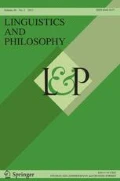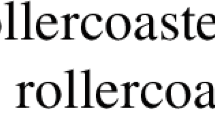Abstract
In this paper we discuss a phenomenon we call perspectival plurality, which has gone largely unnoticed in the current debate between relativism and contextualism about predicates of personal taste (PPTs). According to perspectival plurality, the truth value of a sentence containing more than one PPT may depend on more than one perspective (subjects, experiencers or judges). Prima facie, the phenomenon engenders a problem for relativism and can be shaped into an argument in favor of contextualism. We explore the consequences of perspectival plurality in depth and assess several possible responses on behalf of advocates of relativism.
Similar content being viewed by others
References
Brogaard, B. (2008). Moral contextualism and moral relativism. The Philosophical Quarterly, 58, 385–409.
Cappelen, H., & Hawthorne, J. (2009). Relativism and monadic truth. Oxford: Oxford University Press.
Cappelen, H., & Lepore, E. (2002). Indexicality, binding and a priori truth. Analysis, 62, 271–281.
Collins, J. (2013). The syntax of taste. Philosophical Perspectives, 27, 51–103.
Geurts, B., & Rubio-Fernández, P. (2015). Pragmatics and processing. Ratio, 28, 446–469.
Glanzberg, M. (2007). Context, content, and relativism. Philosophical Studies, 136, 1–29.
Huvenes, T. T. (2012). Varieties of disagreement and predicates of taste. Australasian Journal of Philosophy, 90, 167–181.
Kamp, H. (1971). Formal properties of ‘now’. Theoria, 37, 227–274.
Kaplan, D. (1989). Demonstratives. In J. Almog, J. Perry, & H. Wettstein (Eds.), Themes from Kaplan (pp. 481–563). Oxford: Oxford University Press.
Katz, G. (2005). Attitudes toward degrees. In E. Maier, C. Bary, & J. Huitink (Eds.), Proceedings of SuB 9 (pp. 183–196). Nijmegen: Radboud Universiteit Nijmegen.
King, J. (2003). Tense, modality and semantic values. Philosophical Perspectives, 17, 195–245.
Kissine, M. (2012). From contexts to circumstances of evaluation: Is the trade-off always innocuous? Synthese, 184, 199–216.
Kneer, M. (2015). Perspective in language. Dissertation, Institut Jean Nicod/ENS Paris.
Kneer, M. (ms.). Perspectival plurality in natural language.
Kölbel, M. (2004). Indexical relativism vs genuine relativism. International Journal of Philosophical Studies, 12, 297–313.
Kölbel, M. (2009). The evidence for relativism. Synthese, 166, 375–394.
Kölbel, M. (2011). Objectivity, relativism and context dependence. Hagen: Fern Universität Hagen.
Lasersohn, P. (2005). Context dependence, disagreement, and predicates of personal taste. Linguistics and Philosophy, 28, 643–686.
Lasersohn, P. (2008). Quantification and perspective in relativist semantics. Philosophical Perspectives, 22, 305–337.
Lasersohn, P. (2009). Relative truth, speaker commitment, and control of implicit arguments. Synthese, 166, 359–374.
Lasersohn, P. (2013). Non-world indices and assessment-sensitivity. Inquiry, 56, 122–148.
Lewis, D. (1980). Index, context, and content. In S. Kanger & S. Ohman (Eds.), Philosophy and grammar (pp. 79–100). Dordrecht: Reidel.
Lihoreau, F. (2012). Personal taste ascriptions and the Sententiality assumption. The Reasoner, 6, 143–144.
MacFarlane, J. (2009). Nonindexical contextualism. Synthese, 166, 231–250.
MacFarlane, J. (2012). Relativism. In D. Graff Fara & G. Russell (Eds.), The Routledge companion to the philosophy of language (pp. 132–142). New York: Routledge.
MacFarlane, J. (2014). Assessment sensitivity: Relative truth and its applications. Oxford: Oxford University Press.
Martí, L. (2006). Unarticulated constituents revisited. Linguistics and Philosophy, 29, 135–166.
Moltmann, F. (2010). Relative truth and the first person. Philosophical Studies, 150, 187–220.
Nouwen, R. (2005). Monotone amazement. In P. Dekker & M. Franke (Eds.), Proceedings of the fifteenth Amsterdam Colloquium (pp. 167–172). Amsterdam: ILLC.
Pietroski, P., Lidz, J., Hunter, T., & Halberda, J. (2009). The meaning of ‘most’: Semantics, numerosity and psychology. Mind and Language, 24, 554–585.
Potts, C. (2005). The logic of conventional implicatures. Oxford: Oxford University Press.
Recanati, F. (2002). Unarticulated constituents. Linguistics and Philosophy, 25, 299–345.
Recanati, F. (2007). Perspectival thought: A plea for moderate relativism. Oxford: Oxford University Press.
Richard, M. (1981). Temporalism and eternalism. Philosophical Studies, 39, 1–13.
Rothschild, D., & Segal, G. (2009). Indexical predicates. Mind and Language, 24, 467–493.
Sæbø, K. J. (2009). Judgment ascriptions. Linguistics and Philosophy, 34, 327–352.
Schaffer, J. (2011). Perspective in taste predicates and epistemic modals. In A. Egan & B. Weatherson (Eds.), Epistemic modality (pp. 179–226). Oxford: Oxford University Press.
Sennet, A. (2008). The binding argument and pragmatic enrichment, or, why philosophers care even more than weathermen about ‘raining’. Philosophy Compass, 3, 135–157.
Snyder, E. (2013). Binding, genericity and predicates of personal taste. Inquiry, 56, 278–306.
Stanley, J. (2005). Knowledge and practical interests. Oxford: Oxford University Press.
Stanley, J. (2007). Language in context. Selected essays. Oxford: Oxford University Press.
Stephenson, T. (2007). Judge dependence, epistemic modals, and predicates of personal taste. Linguistics and Philosophy, 30, 487–525.
Stojanovic, I. (2007). Talking about taste: Disagreement, implicit arguments, and relative truth. Linguistics and Philosophy, 30, 691–706.
Vlach, F. (1973). ‘Now’ and ‘then’: A formal study in the logic of tense anaphora. Dissertation, University of California, Los Angeles.
Zeman, D. (2013). Experiencer phrases, predicates of personal taste and relativism: On Cappelen and Hawthorne’s critique of the operator argument. Croatian Journal of Philosophy XIII, 39, 375–398.
Author information
Authors and Affiliations
Corresponding author
Rights and permissions
About this article
Cite this article
Kneer, M., Vicente, A. & Zeman, D. Relativism about predicates of personal taste and perspectival plurality. Linguist and Philos 40, 37–60 (2017). https://doi.org/10.1007/s10988-016-9198-z
Published:
Issue Date:
DOI: https://doi.org/10.1007/s10988-016-9198-z



